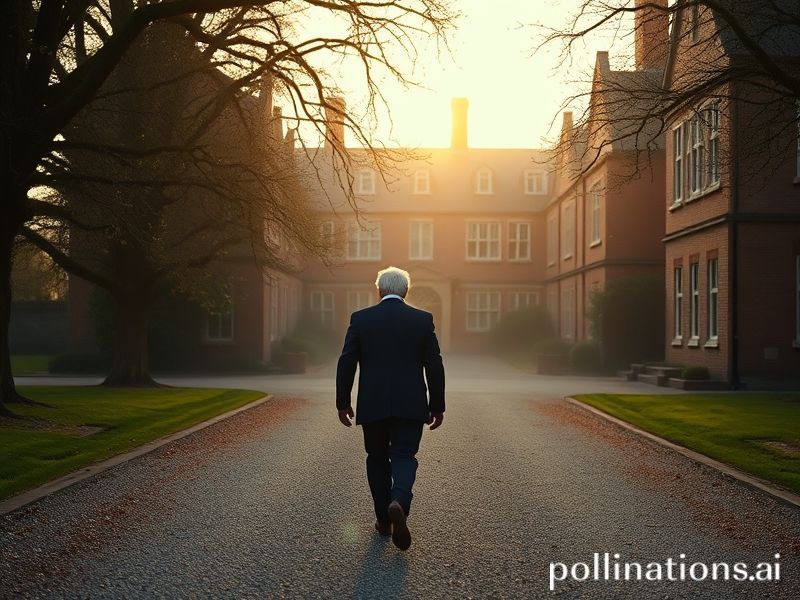Chequers Prime Minister: How a Country House Became Ground Zero for Global Anxiety
Chequers Prime Minister: A Weekend in the English Countryside That Shook the World
By Dave’s International Affairs Desk
If you ever wondered where the fate of 67 million Britons—and, by extension, the global financial system—gets decided on a rainy Friday afternoon, the answer is a 16th-century manor house whose greatest architectural triumph is its ability to look quaint while hosting geopolitical nervous breakdowns. Welcome to Chequers, the Buckinghamshire retreat where prime ministers are ritually marinated in bad news, lukewarm soup, and the faint smell of ancestral panic. This week, the latest occupant of Number 10 added a fresh coat of existential dread to the paneling, proving yet again that the UK’s most successful post-war export is not steel, Beatles albums, or even overpriced gin, but rather high-grade political theater with subtitles for the rest of the planet.
For those just tuning in from less soggy latitudes, “Chequers Prime Minister” is not a new Netflix limited series—though the pitch writes itself: “House of Cards meets Downton Abbey, with 30 % more self-immolation.” It is, instead, the shorthand for whoever staggers out of Chequers Court after a supposedly private weekend of “reflection” clutching either a resignation letter or a hastily photocopied roadmap nobody intends to follow. The ritual is older than Brexit, older than the internet, and only slightly younger than the Magna Carta, which was probably written in nicer weather.
Global markets, ever the sentimental romantics, pretend they don’t care about another Tory psychodrama. Yet every time a prime minister pops into Chequers to “clear their head,” the pound does its best impression of a skydiver who forgot the parachute, and Asian trading desks scramble to price in the possibility that a nuclear power might accidentally appoint a lettuce as head of government. (Don’t laugh; the lettuce already led Liz Truss by three days.) Meanwhile, Washington, Beijing, and Brussels update their respective spreadsheets labeled “UK—stable?” and quietly move the decimal point one notch left.
Europe, still nursing the hangover from Britain’s 2016 stag-do referendum, watches Chequers like an ex who claims to be “totally over it” but keeps refreshing the Instagram feed. Parisian diplomats affect bored shrugs, but their briefing notes contain color-coded scenarios ranging from “orderly fudge” to “Britain accidentally re-colonizes Calais in search of a sandwich.” Berlin, ever pragmatic, has simply booked extra warehouse space in Rotterdam for the inevitable lorry queues and started teaching German toddlers the phrase “perfidious Albion” as a vocabulary exercise.
Further afield, the spectacle is less existential and more anthropological. In Tokyo, policy scholars use Chequers weekends as case studies in “elite self-sabotage,” while in Nairobi, traders place informal bets on how many cabinet ministers will resign before tea. Even Moscow, preoccupied with its own pyrotechnics, takes a moment to savor the irony: the country that once lectured the world on parliamentary stability now produces prime ministers with the shelf life of cottage cheese. In the age of TikTok diplomacy, Chequers is less a retreat than a 24-hour reality show reboot nobody asked for.
And yet, the broader significance is grimly serious. Every Chequers Prime Minister leaves behind a debris field of half-signed trade deals, ghost-written op-eds, and EU officials wondering why they studied English only to decipher sentences like “nothing is agreed until everything is agreed, but only on Tuesdays.” The cumulative effect is a slow erosion of what diplomats politely call “institutional memory” and what everyone else calls “having a clue.” When the adults in the room keep departing mid-sentence, the furniture starts making policy.
So, what does the world learn from another Chequers melodrama? First, that the British talent for understatement has finally achieved performance art: a resignation is merely “handing back the keys,” and economic collapse is “a spot of bother.” Second, that every empire, no matter how storied, eventually devolves into a very expensive Airbnb with delusions of grandeur. And third, that if you must choose between stability and entertainment, the UK will always choose the option that requires popcorn.
As the sun sets over the Chilterns and another prime ministerial car crunches down the gravel driveway—destination either oblivion or a speaking tour—the rest of us are left with the familiar aftertaste of schadenfreude and mild terror. Because in a world already teetering on the brink of every possible abyss, the last thing anyone needed was a reminder that even the stiffest upper lip can still be read for trembling.
But hey, at least the gardens looked nice on the helicopter footage.







